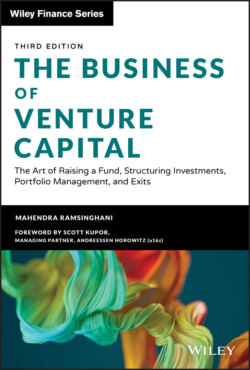Читать книгу The Business of Venture Capital - Mahendra Ramsinghani - Страница 31
Mind Your Language … and Your Handwriting
ОглавлениеWhen Forbes profiled Arthur Rock, a young investment manager in Boston, Dick Kramlich read the article with great interest. Arthur was hiring. “Well, I'm gonna find a younger partner …” Dick sat down and wrote him a longhand letter. “I never had ever done anything like this before” he would recall. “The following Monday I got a telephone call. “Mr. Rock's on the line.”
Arthur hired Dick shortly thereafter. “I found out there were over a thousand responses to the article. And that Arthur had a handwriting expert that analyzed my letter. Isn't that funny? So that's how I got in the venture business.” Later, Dick Kramlich went to found New Enterprise Associates (NEA), a multibillion-dollar global venture fund.
Terry McGuire, a venture capitalist of 25 years and Emeritus Chairman of National Venture Capital Association, spent a year in Ireland soon after college, where he learned to speak Gaelic. Coincidentally, at his first job interview, the interviewer spoke fluent Gaelic. He muttered, “An bfhuil se fluic, amach?” which is Gaelic for “Is it wet outside?” Terry promptly responded in Gaelic. The two hit it off, and Terry landed the job.13 But was it just a stroke of luck? It certainly helped that Terry was the president of the Harvard Business School Venture Capital Club. “It's a combination of training, the network, and opportunity that presented itself,” says Terry. Terry went on to start Polaris Ventures after a seven-year stint at this Chicago-based venture firm.
Candidates often underestimate the power of internship opportunities. Many practitioners would be open to a thoughtful email or a call along the lines of “Hi, I am graduating next year and wanted to explore a summer internship. I have studied your investment thesis and have identified a few opportunities that may be of interest. Let me know if I can come by and discuss these.” That kind of an opening gambit is bound to get a response.
Often, those at a junior level may wonder if entrepreneurs will engage with them. The debate is rife with opinions of a thousand bloggers: entrepreneurs should only talk to those professionals who can make decisions. While various blogs emphasize the important attributes of the investor's stature, experience, decision-making abilities, or getting the deal done, to get to the decision makers, the starting point is often a junior person. Pat Grady, partner at Sequoia Capital for over 12 years says, “When I joined Sequoia back in 2004, I was the youngest in the firm but my title was partner. For Sequoia, this was never about a ‘sourcing’ gimmick, making sure that founders ‘talk only to partners’ hence this title. It was a genuine intention to align everyone for the same outcomes. We do not have hierarchies in this firm and we work closely with each other.”
